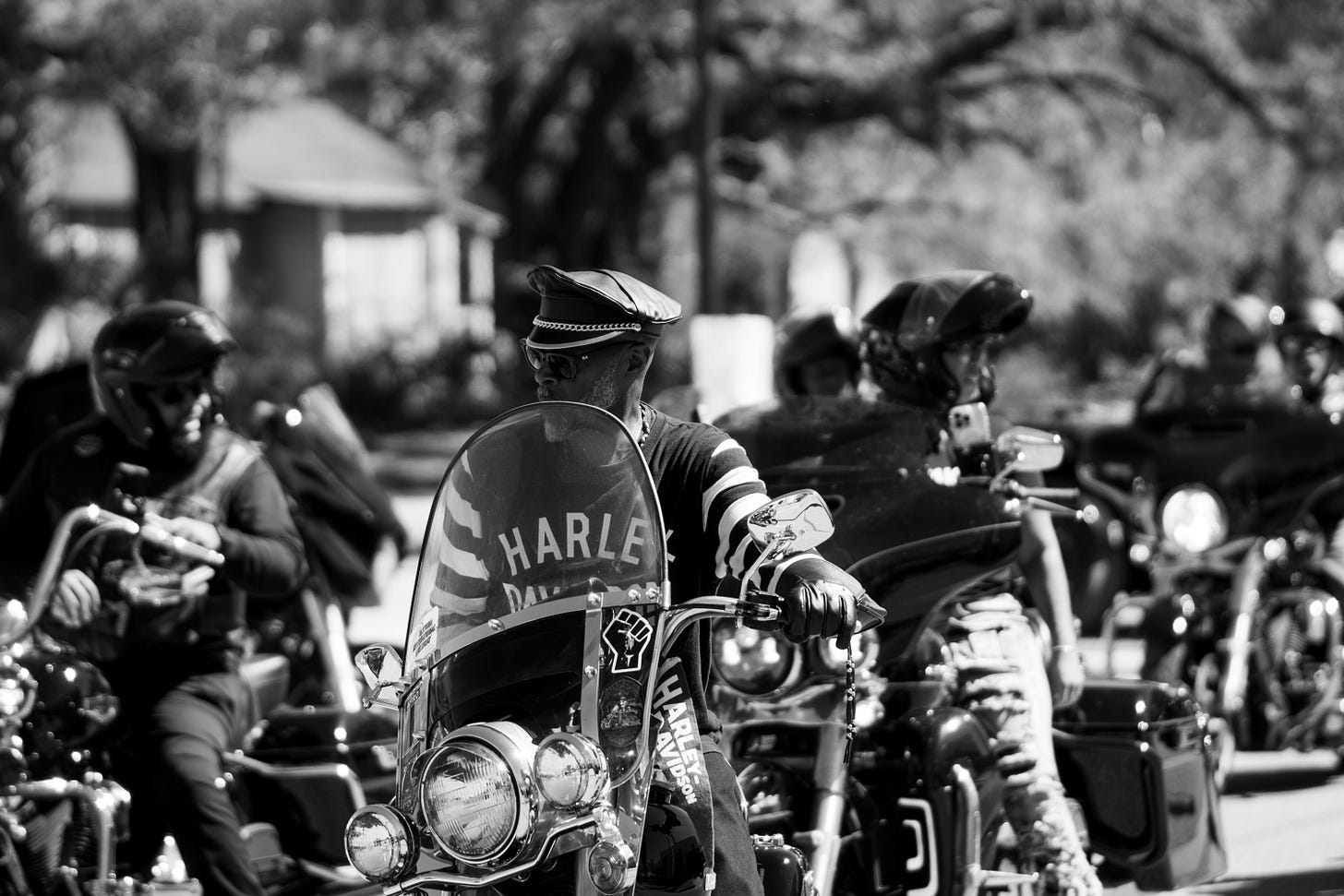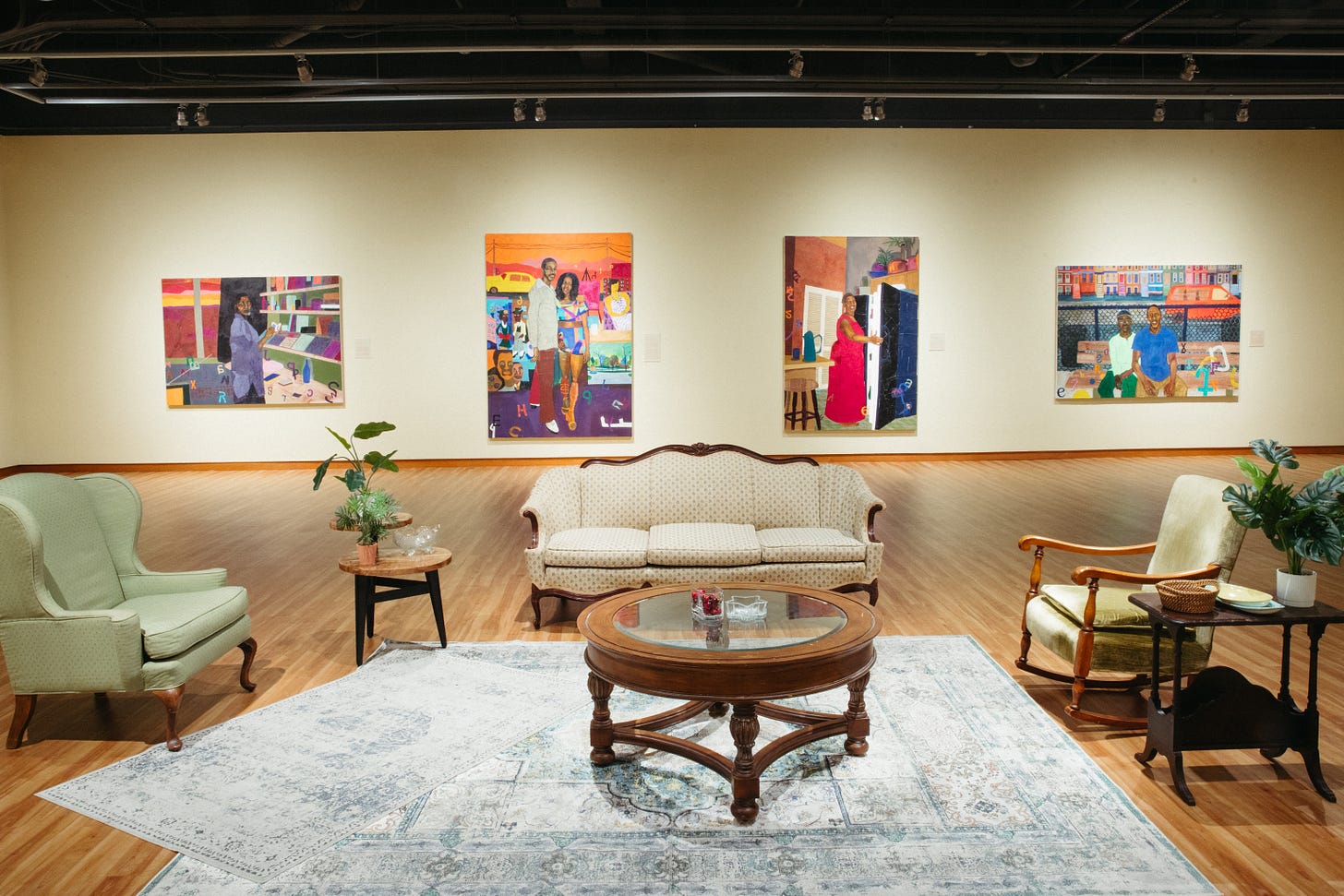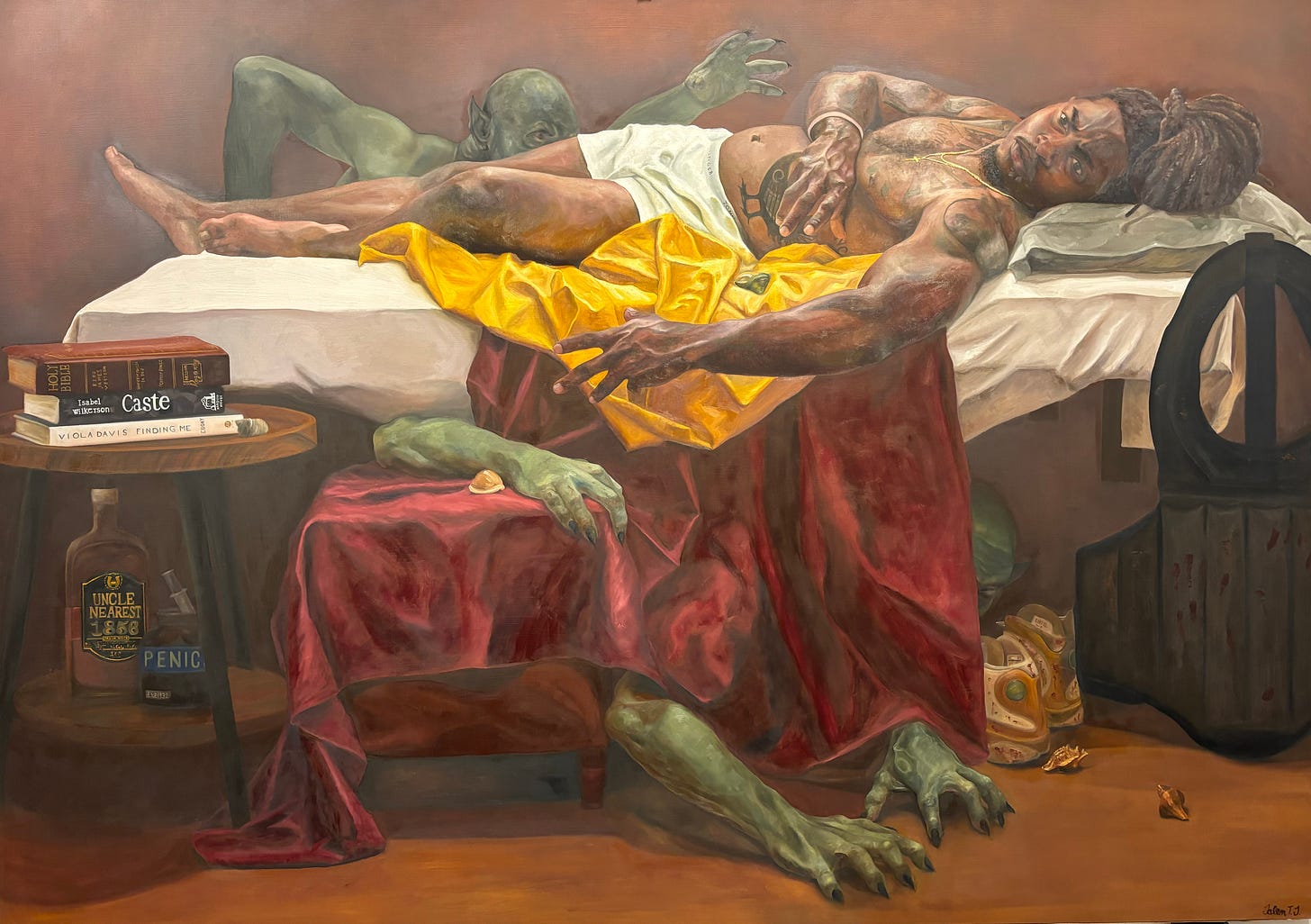Inside the Gantt: memory, motorbikes and mixed media
Plus: Teen Talk + The news of the week — City council filing frenzy; Charlotte's new medical school opens; Pro soccer all-star game coming next year; Breweries brace for can shortage
Good morning! Today is Saturday, July 19, 2025. You’re reading The Charlotte Ledger’s Weekend Edition.
Need to subscribe — or upgrade your Ledger e-newsletter subscription? Details here.
Today’s Ledger is sponsored by Tryon Medical Partners. Sick visit? Same-day appointment? Annual physical? Start with us! Our award-winning clinicians are welcoming new patients and building stronger relationships at multiple locations throughout the Charlotte area.
Review: Gantt Center trio — Black life in memory, on motorbikes and in multiple media
Alvin C. Jacobs Jr.’s “Black Behind Bars: The Untold Story of Black Biker Culture” exhibition runs through Sept. 21 at the Harvey B. Gantt Center. The art pictured above, called “Black,” is a 36-by-24-inch archival pigment print on brushed aluminum. (Photo courtesy of Alvin C. Jacobs Jr.)
By Lawrence Toppman
I happened to vacation in Myrtle Beach last fall during Black Bike Week, and I took time to marvel at the slow, stately procession of riders on handsomely decorated motorbikes. I talked to a couple of them, shouting over the throaty laughter of their engines, and they filled me in on the proud tradition of African-American motorcyclists.
So when I heard the Gantt Center had an exhibit titled “Black Behind Bars: The Untold Story of Black Biker Culture,” I pointed my old-guy ride (a 2020 Camry hybrid) toward Tryon Street. The surprise was not that I enjoyed the show, but that I enjoyed others on view more. The Gantt has mounted a trio of exhibits about life in the old neighborhood, in the streets and in the mind.
The strongest seems to me to be the most focused: eight large paintings in “Cherry: Khalif Tahir Thompson,” running through Aug. 17. It’s sadly easy to read “Ballad of Blue and Brown” as autobiographical, representing two realities in the life of the infant Thompson. (He’s now 30). In the right panel, weary but protective Glenn Thompson watches over his grandson in his kitchen; in the left panel, connected to the right but clearly in another building, an angry man lifts his fist to a contemptuous woman.
The brochure compares Thompson to Romare Bearden and Jacob Lawrence, but his influences spill across centuries and cultures, and he depicts some of them in his work. “Lenox Avenue” lifts a stylish Harlem couple out of time — the car says ’40s, the clothes say ’60s — and surrounds them with small reproductions of works by artists Thompson admires: Faith Ringgold, Henri Matisse, William H. Johnson.
Realistic depictions and fantastic images dance through this exhibit hand-in-hand. His tired aunt seeks a nightcap from a refrigerator covered in pleather; birds and abstract shapes float through a living room, as a black cat plays with an orange ball below; gray mountains, ochre deserts and green seas can be observed just outside windows of suburban homes. Thompson scatters numbers, letters (some written backward, as kids will) and symbols through his paintings, spilling memories from his childhood in a mysterious jumble.
“Cherry: Khalif Tahir Thompson” exhibition at the Harvey B. Gantt Center (Photo courtesy of Christine Hussey Photography)
“Black Behind Bars,” up through Sept. 21, stays literal. The title refers to handlebars, of course, but it has overtones of the image of bikers as outlaws, possibly criminals. Alvin C. Jacobs Jr., an Illinois native who lives in Charlotte, knocks us back as soon as we step in the room: “Elwood,” his gleaming 2008 Harley-Davidson Road King, stands next to a mannequin wearing his dad’s leather jacket, cap and pointed boots.
The other three walls contain photos that replace the notion of biker gangs with biker families. Kids ride on mini-cycles; an old man munches at a picnic; riders alone or in tandem or in respectful lines (like those I saw in Myrtle Beach) share fellowship. Jacobs took many of these photos at night or slightly out of focus, to give them a dreamlike quality, and you feel you’re stepping out of your daytime life into uncharted territory.
Unfortunately, the wall text and photos don’t go together. I relished reading about Ben Hardy, whose South Central L.A. creations ended up in the movie “Easy Rider,” and Bessie Stringfield, a civilian dispatch rider during World War II who became the first black woman to ride across the U.S. on a motorcycle. But I didn’t see what they looked like, because the exhibit limits its display to Jacobs’s vision.
“Chop Shop: We Are Here” (which runs through Oct. 26) sprawls across the visions of 15 artists who belong to that collective. Chop Shop formed during the Covid pandemic after the murder of George Floyd, and the artists’ statement at the exhibit says it offers “a collective exploration of racial consciousness.” In this show, that exploration can be allegorical or direct, subtle or blunt, abstract or realistic, angry or optimistic.
My favorite piece, Jalen Jackson’s “Cessation Before Metanoia,” covers that spectrum by itself. (“Metanoia” is a change in one’s way of life due to penitence or spiritual conversion.) The Bible, Viola Davis’s “Finding Me” and Isabel Wilkerson’s “Caste” — a favorite history target of revisionist conservatives — sit on the reading table of a dazed, much-tattooed man whose reflections have released demons, like the guy in Goya’s “The Sleep of Reason Produces Monsters.”
“Cessation Before Metanoia” by Jalen Jackson, oil on canvas, 60 by 84 inches. (Photo courtesy of Jalen Jackson)
More didactic works don’t dig that deep. The single-named Ransome’s “Ice Cream Truck,” where inner-city black kids lick vanilla ice cream cones, clumsily argues the white vendor represents “a proliferation of racial propaganda urging black children to imbibe in large quantities of mass media and white culture.” Sometimes ice cream is just ice cream.
Chris Clark’s joyful paintings of kids with explosions of dreadlocks honor black traditions and Rastafarian roots with titles such as “No Vanity” and “They Used to Call Me.” Percy King’s “Untitled II,” a mixed-media piece, gives us a woman as a powerful archetype of resilience, wearing a mask and a raffia top and skirt that indicate her African past.
Don’t leave without seeing Berrisford Boothe’s perplexingly beautiful abstracts, colorful circles nestled within each other. You’ll need the wall text to know they represent “broken yet powerful soul energy,” linking him to his late brother, the artist Ras Ibrak. In Boothe’s case, the exhibit title “We Are Here” means not just now but for eternity.
Lawrence Toppman covered the arts for 40 years at The Charlotte Observer before retiring in 2020. Now, he’s back in the critic’s chair for The Charlotte Ledger — look for his reviews several times each month.
➡️ You can be sure each Toppman review goes straight to your inbox by signing up for The Ledger’s Toppman on the Arts newsletter.
Today’s supporting sponsor is Caregiving Corner. Caring for aging parents can be confusing & complicated. At Caregiving Corner, our team of care managers brings their decades of healthcare experience to families to help plan for all aspects of aging and caregiving. From managing medications & multiple medical providers to choosing care providers and reviewing budgets, our goal is to simplify caregiving for families.
Teen Talk: When someone looks their best
Impress and delight the young people in your life by using the words they use. The Ledger shows you how in this occasional Saturday feature.
Term: “Face card never declines”
Definition: An expression — popular on social media — used to praise someone’s physical appearance or attractiveness. The phrase compares one’s good looks to a credit card that never gets declined and means that the person’s beauty or charm always makes an impression, no matter the situation.
Examples:
“I can’t believe you just woke up — no makeup, hair messy, PJs on — and you’re still a 10. Face card never declines.”
“Even your ID photo looks good — that’s unheard of. Your face card just never declines!”
“We look great in that mirror selfie! I'm going to caption it ‘Ready to hit the town! Face card never declines.’”
—Caroline Mecia, age 22
This week in Charlotte: County approves pool rentals; Bojangles expands to Colorado; MLS All-Star game coming to Charlotte; Feds withhold $12M from CMS
On Saturdays, The Ledger sifts through the local news of the week and links to the top articles — even if they appeared somewhere else. We’ll help you get caught up. That’s what Saturdays are for.
Education
Millions in federal funds for CMS at risk: (WSOC) The U.S. Department of Education is withholding over $12M in federal grant money meant for Charlotte-Mecklenburg Schools pending a review of how the funds were used.
Shift from public schools grows in NC: (News & Observer) For what is most likely the first time in state history, fewer than 75% of students are enrolled in traditional public schools, with over 25% now attending private or charter options.
Politics
Candidate filing frenzy: (Ledger 🔒) The final day for candidates to file for Charlotte’s city council and school board races this fall was Friday, and the election is shaping up. Highlights include Republican Edwin Peacock’s return bid, Summer Nunn’s decision not to seek re-election and confirmation that Mayor Vi Lyles won’t face a challenge from Jennifer Roberts. See the full list of candidates at the Board of Elections’ website. The Ledger will once again provide a full local election guide for the Sept. 9 primary and Nov. 4 general election.
Local news
Charlotte’s new med school opens: Charlotte’s new Wake Forest medical school opened Monday with a high-tech, patient-focused approach that replaces cadaver labs and lectures with virtual anatomy, life-like robots and real-world problem-solving. But despite launching with a pledge to build one of the nation’s most diverse student bodies, the school has repeatedly declined to release the racial and ethnic makeup of its inaugural class.
Mecklenburg allows private pool rentals: (WFAE) As of July 1, homeowners in Mecklenburg County can legally rent their backyard pools via platforms like Swimply, but must meet state safety regulations, such as performing regular chemical testing and maintaining non-slip decks.
Local breweries brace for can shortage: (Charlotte Magazine) Charlotte brewers are feeling the strain of new aluminum tariffs, with supply chain uncertainty and higher costs for materials.
Business
Brighthouse Financial may soon have a new owner: (Wall Street Journal, subscriber-only) Aquarian Holdings is in exclusive talks to acquire Brighthouse Financial, a major Charlotte-based U.S. life insurer valued at around $2.8B, with a deal expected in the coming weeks.
Bojangles expands into Colorado: (WSOC) Charlotte-based Bojangles has opened its first Colorado restaurant in Pueblo.
Sports
2026 MLS All-Star Game coming to Charlotte: (Axios) Don Garber, commissioner of Major League Soccer, announced that Bank of America Stadium will host the 2026 All-Star Game.
From the Ledger family of newsletters
Monday
The Wake Forest University School of Medicine launched in Charlotte this week. Plus: Creator of iconic uptown bronze disc passes away; Construction keeps cooling; Transit tax costs; Levine Foundation explains stepped-up giving; Carolina Lightnin' memories; Beds for Kids growing
Wednesday (🔒)
Mecklenburg’s new parks director, Nick Walker, says he’s focused on expanding access in a Q&A and Charlotte Ledger podcast episode. Plus: Local nonprofit advocates for county parks; Higher vacancy rates reported at newer office buildings; New American Airlines lounge headed to CLT; Ledger wins regional award
Friday (🔒)
Charlotte’s new med school has yet to release data from underrepresented groups. Plus: Candidate filings for November's election; Mecklenburg home sale prices continue to fall; Charlotte tattoo artist goes viral for paramedical tattooing
Real Estate Whispers
An office ‘flight to quality’ — or a gradual shift? Plus: CLT buys more land south of the airfield; Office building sale price exceeds tax value; Readers offer real estate forecasts; Arboretum rezoning and more!
Futbol Friday
Patrick Agyemang’s $10M transfer from Charlotte FC to England’s Derby County highlights MLS’s evolving role as a selling league in global soccer, where developing and exporting talent—especially to Europe—is now seen as both a necessary strategy and a recruiting advantage.
Need to sign up for this e-newsletter? We offer a free version, as well as paid memberships for full access to all 6 of our local newsletters:
The Charlotte Ledger is a locally owned media company that delivers smart and essential news. We strive for fairness and accuracy and will correct all known errors. The content reflects the independent editorial judgment of The Charlotte Ledger. Any advertising, paid marketing or sponsored content will be clearly labeled.
◼️ About The Ledger • Our Team • Website
◼️ Newsletters • Podcast • Newcomer Guide • A Better You email series
◼️ Subscribe • Sponsor • Events Board • Merch Store • Manage Your Account
◼️ Follow us on Facebook, Instagram, X/Twitter, LinkedIn







